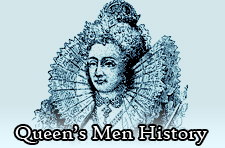
About the Queen’s Men History
Recognizing the significance of the Queen’s Men’s theatre history at the beginning of the 21st century requires digging and diligence. Most extant records dealing with them are dryly fiscal, their dramatic accomplishments have been overshadowed by the theatre scene of late sixteenth-century London, and none of their extant plays were written by a Shakespeare, a Marlowe, or a Jonson. But while they may fall below the radar of many contemporary audiences and readers of renaissance drama, their accomplishments were stunning, and from the beginning of their career, the Queen’s Men were destined to be – if nothing else – remarkable.
Inception
The Queen’s Men were, from their inception, a unique company. Founded in 1583 under the aegis of Queen Elizabeth I, the players who became members of the Queen’s Men were drafted from existing troupes such as Leicester’s Men and Sussex’s Men to form an all-star company. Several explanations exist as to why the Queen’s Men were formed – perhaps the theatre-loving Elizabeth granted her imprimatur to protect great players from anti-theatrical civic authorities, or perhaps she did so as part of an effort regularize playing companies – but their subsequent role and success are clear.
Popularity
Until the beginning of the 1590s, they performed regularly at court during the annual Christmas festivities, they were popular among London’s discerning theatre audiences, and they were certainly the most prestigious and popular company in the nation. Traveling well-worn routes through the provinces, the Queen’s Men would regularly appear in cities and towns, be granted permission to play, and would be paid – more than any other contemporaneous company – to perform. Even after the famous London companies such as the Admiral’s Men became more popular than the Queen’s Men at court and in the city, the Queen’s Men continued to tour the provinces, and they remained the most successful company outside London until they finally disbanded in 1603.
“even if we know significantly less about the Queen’s Men and their plays than we know about Shakespeare, it is certain that our theatrical inheritance would be considerably less rich if not for the 20 years they spent touring England as servants of their monarch”
Ideological Work
Apart from entertaining Elizabeth at court, the Queen’s Men also performed political and ideological work on her behalf. As one might expect of a company who traveled under the queen’s protection their plays espoused political views in line with royal policy when they toured the country: they idealized moderate Protestantism, they celebrated English nationalism, and they occasionally included encomiastic tributes to Elizabeth and her forebears. Indeed, their plays mostly lend themselves easily to this ideological work: regular doses of comedy no doubt contributed to their myth-making history plays that dealt with national monarchs including King Leir, King John, Henry IV, Henry V, and Richard III.
Quite possibly the Queen’s Men also served as informants to the queen and her privy council, gathering information from the provinces when they traveled. Considering that Elizabeth’s so-called spymaster Sir Francis Walsingham was integral in the founding of the Queen’s Men – even though he otherwise showed little interest in drama – such questions about their work as informants seem inevitable.
Impact on Shakespeare
While it takes considerable digging and diligence to understand the Queen’s Men at the beginning of the 21st century, their dramatic legacy was substantial and it remains quite familiar. For instance, though we’re more likely to see one of Shakespeare’s histories on stage than we are to see one of the Queen’s Men’s, it was the Queen’s Men who invented the form of history play that Shakespeare reproduced to such great effect.
Shakespeare’s professional relationship with the Queen’s Men is unclear and it is likely to remain unclear unless new evidence is discovered, but Shakespeare certainly relied on the Queen’s Men’s plays when writing his own histories, taking plots, characters, and occasionally phrases from The True Tragedy of Richard III, for instance, or The Famous Victories of Henry V. Less precisely, the Queen’s Men’s also seem to have influenced Shakespeare’s comic sensibility and they perhaps suggested to him the dramatic effectiveness of the juxtaposition of high and low scenes – a device that the Queen’s Men use to great effect in most of their plays. Indeed, even if we know significantly less about the Queen’s Men and their plays than we know about Shakespeare, it is certain that our theatrical inheritance would be considerably less rich if not for the twenty years they spent touring England as servants of their monarch. This website focuses primarily on the Queen’s Men and the SQM productions but the Production Resources section points to connections with Shakespeare.
Further Research
If you are interested in learning more about the Queen’s Men, please refer to Scott McMillin and Sally-Beth MacLean’s The Queen’s Men and their Plays (Cambridge, Cambridge University Press, 1998). This ground-breaking book was the inspiration for our project and examines the company and its plays in great depth.
